The Daily 202: Trump triangulates on trade. Here are five takeaways from the tariff announcement

| Trump triangulates on trade. Here are five takeaways from the tariff announcement. | ||
|
| BY JAMES HOHMANN | ||
| with Breanne Deppisch and Joanie Greve
THE BIG IDEA: President Trump campaigned like a populist but has mostly governed like a plutocrat. On trade, he’s decided to follow his populist id.
Trump has few core convictions. He has been all over the place on almost every issue. Trade is the biggest exception. The president has consistently agitated for protectionism since the 1970s, and it was a signature theme of his insurgent candidacy.
On Thursday, he followed through on his campaign rhetoric by announcing that he plans to slap tariffs of 25 percent on foreign-made steel and 10 percent on aluminum.
“You will have protection for the first time in a long while, and you’re going to regrow your industries,” Trump told steel executives at a White House meeting. “What’s been allowed to go on for decades is disgraceful.”
The president added this morning on Twitter that “trade wars are good, and easy to win.”
Trump prioritized delivering for the blue-collar workers in the Rust Belt who put him in the Oval Office over placating the corporatists who have dominated his adopted party for generations. Wall Street and their allies on Capitol Hill were shocked because they didn’t think he would follow through on what he said repeatedly he would do on the stump. After all, his views have been so fungible on so much else. But Trump’s belief that Americans have been suckered by bad trade deals turned out to be much more deeply held than the elites realized – especially with the pro-market forces weakened and marginalized in the West Wing.
The president went ahead with the unexpected announcement even after Gary Cohn, his top economic adviser, reportedly threatened to resign. Treasury Secretary Steven Mnuchin told Trump that the stock market gains he loves to boast about would reverse themselves. Defense Secretary James Mattis, who he’s normally inclined to defer to, warned that this would hurt U.S. relationships with allies.
Companies that use steel and aluminum, including automakers, account for vastly more jobs than producers of the metals, and they argued that as many as 200,000 jobs were lost when George W. Bush imposed steel tariffs in 2002 that were later ruled to be illegal by the World Trade Organization.
Just as much as protectionism is a core conviction for Trump, open markets are gospel for many Republicans. It’s one of the issues that Republican lawmakers have been most willing to publicly break with him on.
Conservatives who believe more in free markets than cults of personality are freaking out. The Wall Street Journal editorial page calls this “the biggest policy blunder” of Trump’s presidency. Speaker Paul Ryan said in a statement that he hopes the president “will consider the unintended consequences of this idea and look at other approaches before moving forward.”
“Protectionism is weak, not strong,” said Sen. Ben Sasse (R-Neb.). “You’d expect a policy this bad from a leftist administration, not a supposedly Republican one.”“There is no standard operating procedure with this administration. Every day is a new adventure for us,” Sen. John Thune (R-S.D.), the No. 3 in Republican leadership, told Erica Werner.
Making for strange bedfellows, Democrats from the industrial Midwest are cheering Trump. “This welcome action is long overdue for shuttered steel plants across Ohio and steelworkers who live in fear that their jobs will be the next victims of Chinese cheating,” said Sen. Sherrod Brown (D-Ohio.), who is up for reelection in a state Trump carried.
The reactions offered a potent reminder that the president got to the Oval Office because he triangulated. His success during the primaries came when he positioned himself against the Republican establishment and as the voice of “the forgotten man” during the general election. Polls show that one of the most popular things he did during his first year in office was cut a deal with “Chuck and Nancy,” the Democratic leaders, to raise the debt ceiling and fund the government over GOP objections.
Such political considerations were a key factor as the president decided to buck the globalists in his orbit. “Trump has been keeping a close eye on the special election this month for a U.S. House seat in western Pennsylvania, which he considers the heart of his political base,” Robert Costa reports. “In recent weeks, he has been told by associates that voters in places such as Pennsylvania’s 18th District are looking for more to be done by the administration … The president has noted that the Republican in the race is struggling in a district where he won by a large margin, those people said.”
It’s also already clear that the tariffs will not lead to any kind of permanent political rupture. While the conservative editorialists at the Journal were having heart palpitations, one of Rupert Murdoch’s other media assets was giving Trump air cover. Fox News host Sean Hannity praised the president for “making good on his campaign promise to rebuild American industry in the face of cheap and unregulated foreign goods."
|
-- Here are five other takeaways from the Trump tariffs:
1. This announcement is partly the consequence of a White House that has been unmoored since Rob Porter’s departure amid allegations of abuse by his two ex-wives. “Porter was part of an exodus of advisers who had worked to try to keep Trump focused and away from his protectionist instincts,” Damian Paletta and Josh Dawsey report. “Porter tried to streamline decisions and corral divergent views into joint meetings, a challenge in a White House that has secret alliances and a flair for sensationalism. There was a weekly meeting on trade that included top advisers and was held to ensure there would not be surprises or rash decisions. … But Porter’s critics believed he was stonewalling and isolating people such as [Peter] Navarro, whom Trump often wanted to hear from but did not have direct access to. When Porter left, this process largely broke down.”
Porter’s departure also weakened White House Chief of Staff John Kelly, whom Trump has repeatedly complained about to friends: “Two senior White House officials said Trump was not listening to Kelly and was making it known to others that he was not listening to Kelly,” per Damian and Josh. “Navarro and [Commerce Secretary Wilbur] Ross helped prepare the … tariff announcement, inviting executives to the White House without notifying a number of other White House advisers. When The Washington Post reported about Trump’s looming announcement Wednesday evening, many top White House officials were caught off guard, including the press office. Kelly told others in the White House that there was nothing for Trump to sign and that nothing had been reviewed by lawyers, according to a senior administration official.”
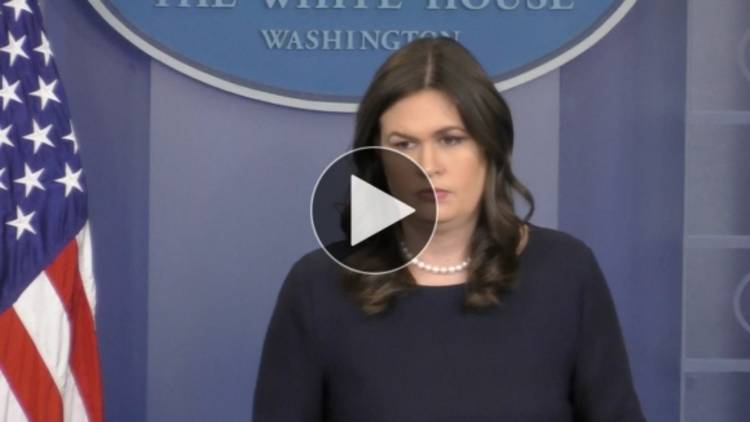 |
| Sanders: Trump administration wants to ‘protect American workers’ |
2. Gary Cohn is on the outs.
“The trade decision signaled the marginalization of White House National Economic Council Director Gary Cohn,” per Damian and Josh. “Cohn has complained loudly to colleagues about the decision and privately said that he might leave — but had not made a final decision.”
The former Goldman Sachs president warned Kelly that he might resign if the president went ahead with the announcement, Mark Landler and Maggie Haberman report in the New York Times. “Cohn, who almost left last year after Mr. Trump’s response to a white nationalist march in Charlottesville, Va., indicated he was waiting to see whether Mr. Trump goes through with the tariffs, people familiar with his thinking said.”
“While Cohn isn’t expected to depart immediately, any decision to step down would greatly diminish the influence of the remaining moderates in the White House — and it would further isolate the New York delegation in the West Wing, including Jared Kushner and Ivanka Trump,” Politico’s Ben White and Andrew Restuccia report. “One person close to Cohn … said he wouldn’t be surprised if he eventually left the chaotic and deeply exhausting administration as a result of the decision. A second person close to Cohn described it as a brutal blow that violated one of [his] core beliefs—that protectionism is economically backward and won’t lead to increased prosperity.”
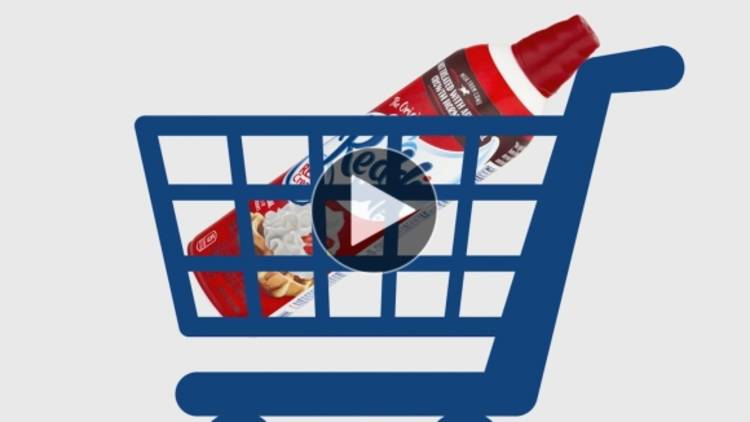 |
| Steel tariffs explained using Reddi-wip whipped cream |
3. The tariffs, depending on how they are designed, may hurt the United States economy much more than they help.
That’s why the markets are spooked. The Dow Jones industrial average plummeted 586 points before closing yesterday down 420 points, and world stocks slumped overnight. “Volatility has returned to markets with a vengeance,” Thomas Heath reports. “If Trump carries through on his tariffs, some investors expect more down months — or at least ongoing volatility. The hardest-hit sectors on Thursday were industrials, technology, financial services and health care. Boeing, United Technologies, Caterpillar, Goldman Sachs and Intel were big drags on the Dow.”
“If the tariffs are instituted, you won’t have to worry about (the Fed) and extra rate hikes this year,” said Jamie Cox of Harris Financial Group in Richmond. “The damage to consumption and manufacturing will slow the economy so dramatically that we may be talking about rate cuts.”
“The prices of many products, including beer and cars, are likely to rise,” Heather Long reports. “If you drink beer, soda or LaCroix, you probably get it from an aluminum can. If you drive a car or truck, it probably has some steel and aluminum in it. … Steel and aluminum are used in a lot of everyday products. The whole goal of Trump’s tariff is to get prices of these metals to rise domestically so it’s profitable enough for U.S. producers to make more steel and aluminum and employ more people. Those price increases are likely to be passed on to consumers.”
“Trump’s move, under a little-used national security provision of U.S. trade law, is expected to trigger legal challenges by China, the European Union and Brazil at the World Trade Organization,” David Lynch and Caitlin Dewey report. “Canada, one of the United States’ closest allies, blasted the step as ‘absolutely unacceptable’ and vowed to respond when the levies take effect. Jean-Claude Juncker, president of the European Commission, dismissed Trump’s national security justification and said the tariffs were ‘a blatant intervention to protect U.S. domestic industry.’ In a slap at China, Trump announced the tariffs even as a top Chinese economic official was in Washington for talks aimed at forestalling a possible trade war.”
- “The aluminum tariff is forecast to create about 1,900 jobs at smelters — but will destroy 23,000 to 90,000 jobs in other manufacturing sectors, said Jorge Vazquez, managing director of Harbor Aluminum.
- “Agriculture has historically been a top target for retaliatory trade actions, and U.S. farm groups have warned that this time will be no different. Already, China is eyeing new duties on U.S. sorghum following the Trump administration’s decision in January to impose tariffs on washing machines and solar panels. The damage to U.S. farmers, especially the soybean industry, could be substantial should China retaliate. U.S. farmers exported $14.2 billion worth of soybeans to China in 2016, nine times as much as was sold to the next-largest U.S. export market.”
- “Every time you do this you get a retaliation, and agriculture’s the number one target,” said Sen. Pat Roberts (R-Kan.), the chairman of the Agriculture Committee.
A contrarian view: Our man in Beijing, Simon Denyer, does not think China will start a trade war over steel tariffs. “China is the world’s dominant steel producer, but experts said the impact of Trump’s decision … won’t have a big impact on China since it only accounts for 2 percent of U.S. imports,” he writes.
 |
| Trump refers to Sessions as 'Mr. Magoo.' Who is the character? |
4 . Trump is showing his age by focusing more on the old economy than the new economy.
The 1950s called. They want their industrial policy back.
The septuagenarian president’s fixation on tariffs as a kind of economic cure-all are a throwback to a bygone era.
Ditto with his focus on steel and aluminum (not to mention coal). Those are raw materials and no longer central to our services-based economy. U.S. Steel only employs about 30,000 workers now, down from 200,000 in the 1960s.
This is part of a pattern for a man who often seems to pine for the “Mad Men” era.
We learned this week that his nickname for Attorney General Jeff Sessions is “Mr. Magoo” and his nickname for Deputy Attorney General Rod Rosenstein is “Mr. Peepers.”
These references date him. Trump was born in 1946. Mr. Magoo made his debut in a 1949 cartoon. “The character rocketed to popularity, eventually jumping to television. Between 1960 and 1962, UPA produced 130 Magoo cartoons,” Kyle Swenson notes.
Mr. Peepers was the namesake character on a sitcom that aired on NBC from 1952 to 1955.
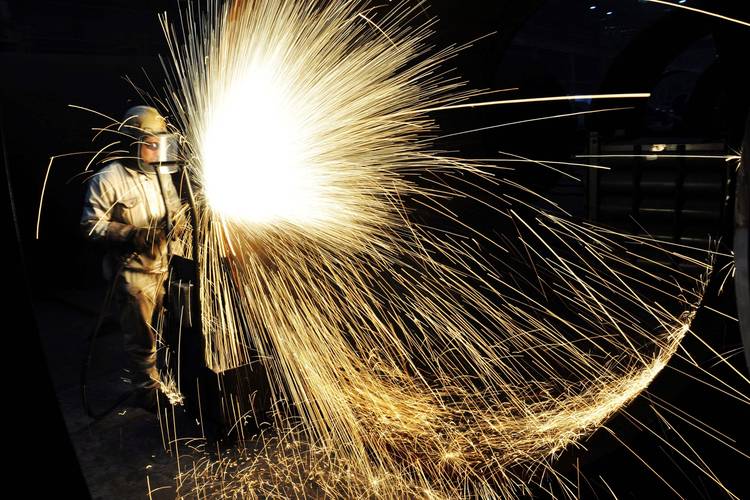
A Chinese worker cuts steel. (AFP/Getty Images)
5. Because the rollout of the tariffs was not choreographed and there was no coordinated messaging coming out of the White House, the coverage of Trump’s announcement is overwhelmingly negative in the mainstream media. From papers in the Rust Belt to the financial press, the cable channels and the Hill rags, here’s a taste of some of this morning’s brutal clips:
- Pittsburgh Post-Gazette: “Stock market plummets after Trump tells steel, aluminum execs he will set import tariffs.”
- Detroit News: “Steel, aluminum tariffs prompt retaliatory threats.”
- Duluth News Tribune (This is the Iron Range of Minnesota, where Trump performed exceptionally well): “White House announces plan for heavy tariffs on imported steel.”
- Kansas City Star: “Sen. [Pat] Roberts says farm states 'not going to be happy' about Trump's tariffs.”
- Fast Company: “You could end up paying more for cars and beer due to Trump’s new tariffs.”
- The Hill: “Paul Ryan breaks with Trump on steel tariffs.”
- Reuters: “Toyota says U.S. tariffs on steel, aluminum will substantially raise production costs.”
- Business Insider: “Trump's newest trade policy has been tried before — and it was terrible for the US economy.”
- CNNMoney: “Trump's new tariffs could make beer, cars and baseball bats more expensive.”
- CNBC: “Trump rolls the dice with the U.S. economy.”
- Forbes: “Fear And Loathing Abound As Trump Vows To Enact Steel And Aluminum Tariffs.”
- The Street: “Trump's Steel, Aluminum Tariffs Cause for Concern Among Analysts, Economists.”
- Globe and Mail: “$300-billion in U.S. market cap wiped out as stocks plunge on Trump steel tariffs.”
- CBS News: “Markets tank...”
- NBC News: “GOP meltdown over Trump plan …”
- Washington Examiner: “Trump's steel tariff push could harm energy dominance agenda, industry groups say.”
- BBC: “Trump steel tariff hike: Foreign nations express alarm.”
- CBC: “Trump's steel tariff could drive up Canada's military procurement costs.”
- Quartz: “Trump’s steel and aluminum tariffs will mean fewer goods ‘Made in America.’”
- LA Times: “Trump … inviting a trade war with China.”
- Newsmax: “Steel Tariffs Called 'Big Mistake' as Factories Already Jammed.”
- New York Times’s The Upshot: “The Real Risks of Trump’s Steel and Aluminum Tariffs.”
- CNN: “Now Trump's White House chaos is rocking the world.”
- AP: “Trump adrift: Tumult in West Wing amid exits, investigation.”
- Axios: “The wild wars within the Trump White House.”
- Wall Street Journal: “Market’s Message: U.S. Allies and Consumers Will Pay Steel-Tariff Bill.”
- The Atlantic: “Trump's ‘Smart’ Tariffs Don't Make Economic Sense: The president says they'll protect American jobs and bolster national security. They'll likely do neither.”
| |
 | |
WHILE YOU WERE SLEEPING:
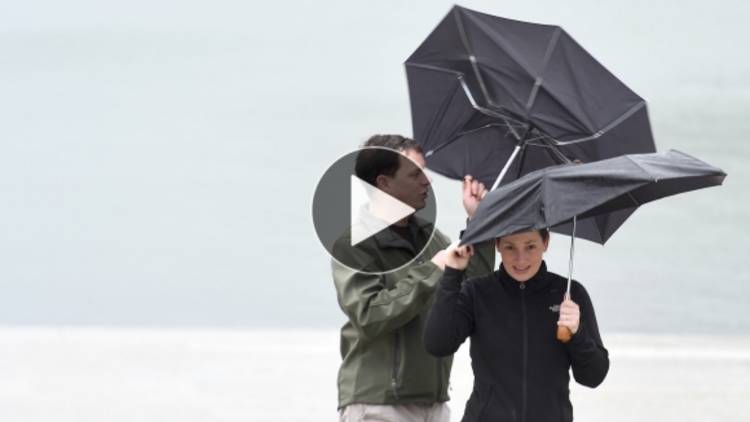 |
| Violent winds, rain and snow: A nor'easter is on its way |
-- Federal offices are closed today because of high winds that could reach up to 80 mph in the D.C. region.
-- Some schools are also closed. Here is the full list.
-- The powerful nor’easter, potentially the most destructive in decades, is striking the East Coast today and tomorrow. The Capital Weather Gang’s Angela Fritz reports: “The coastal flooding could be worse than what New England experienced during the ‘bomb cyclone’ in early January. Storm surge in eastern Massachusetts seems likely to match or exceed the levels of the early January storm as well as the Blizzard of 1978. With a massive, damaging wind field, it will mimic the impact of Hurricane Sandy in 2012. The National Weather Service is calling it a life and death situation along the coast. … The winds will be damaging and will lead to power outages from the Mid-Atlantic to New England.”
-- Here’s what the National Weather Service had to say about the “high-impact” wind threat: “By daybreak, winds across the region will be from the northwest sustained at 30-40 mph, with gusts 60-70 mph. Isolated wind gusts could reach 80 mph, particularly at higher elevations west of the Interstate 95 corridor. … Widespread power outages are expected. Travel will be difficult, especially for high profile vehicles. Pedestrians will face very hazardous conditions, and need to be aware of wind-borne projectiles. People should avoid being outside in forested areas and around trees and branches.” (Jason Samenow)
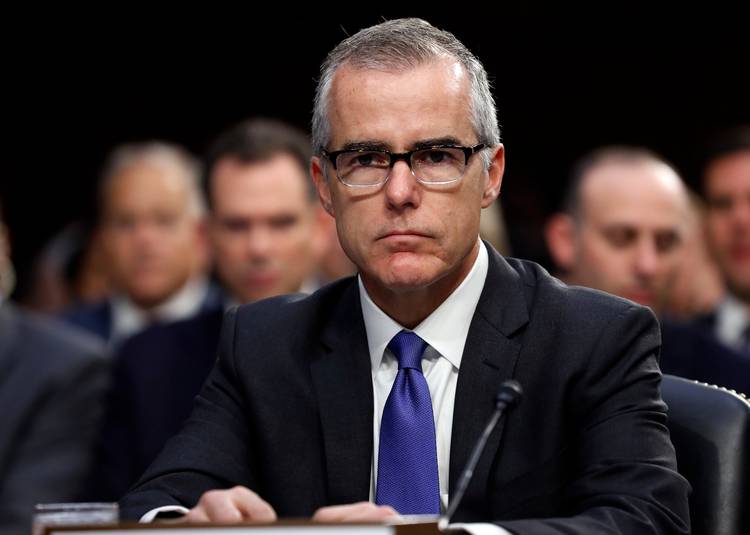
Former FBI deputy director Andrew McCabe appears before Congress. (Alex Brandon/AP)
-- An upcoming report from the Justice Department’s inspector general on the Hillary Clinton email probe is expected to criticize former FBI deputy director Andrew McCabe, a previous target of Trump’s ire, for an improper media disclosure. Matt Zapotosky and Karoun Demirjian report: “During that work, inspector general’s investigators found that McCabe had authorized the disclosure of information to the Wall Street Journal for an October 2016 story that examined feuding inside the FBI and Justice Department around the handling of a separate investigation into Clinton’s family foundation ... Those probing the matter believe that McCabe, who stepped down in January, misled them when they initially inquired about the subject, though one person familiar with the forthcoming report said McCabe disputes that he intentionally misled investigators. It is unclear how McCabe is said to have misled investigators.”
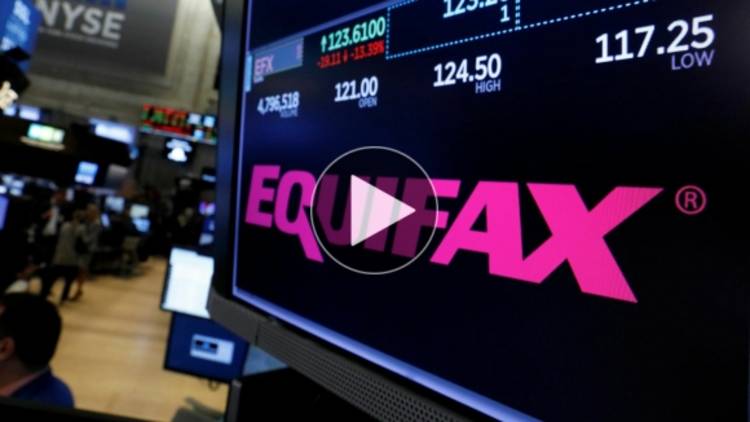 |
| What should you do after the Equifax hack? |
GET SMART FAST:
- Equifax announced that an additional 2.4 million Americans were victims of last year’s data breach. The announcement brings the total number of those affected to roughly 147.9 million, the largest breach of private information in history. (AP)
- A Massachusetts man was charged with sending an envelope containing a suspicious powder to Donald Trump Jr. and other public figures. Daniel Frisiello is also accused of sending similar envelopes to Sen. Debbie Stabenow (D-Mich.), a federal prosecutor and a Republican congressional candidate. (Lindsey Bever)
- Olympic gymnast Aly Raisman is suing the U.S. Olympic Committee over Larry Nassar’s sexual abuse. The gold medalist argues the committee knew or should have known about Nassar’s predatory behavior. "I refuse to wait any longer for these organizations to do the right thing. It is my hope that the legal process will hold them accountable and enable the change that is so desperately needed,” Raisman said in a statement. (NBC News)
- Miami-Dade County schools chief Alberto Carvalho turned down an offer to lead New York City’s school system. Mayor Bill de Blasio had already announced the appointment, but Carvalho reversed his decision after an emotional public meeting with students and administrators who begged him to stay. (Valerie Strauss)
- A grand jury investigating Gov. Eric Greitens issued subpoenas for some of the Missouri Republican’s staffers. (Kansas City Star)
- School closures in West Virginia continued despite a deal with striking teachers. Gov. Jim Justice (R) and the teachers agreed on a 5 percent raise, a proposal that passed West Virginia’s House of Delegates, but statements from state senators have made the teachers nervous about the deal becoming law. (Sarah Larimer)
- The European Union ordered major tech companies to be more aggressive in removing terrorist material from their platforms. Officials warned that the companies will face sweeping new legislation should they fail to remove the content within an hour of it being flagged. (CNN Tech)
- Mike Huckabee was forced to resign from the board of the Country Music Association Foundation just a day after his appointment was announced. Some country music fans criticized CMA, which usually tries to stay out of politics, for overlooking Huckabee’s political views. (Emily Yahr)
- A Denver police officer shared suggestive messages sent to her in 2012 by the city’s mayor. Detective Leslie Branch-Wise showed a local television news outlet images of Mayor Michael Hancock (D) texting her, “You look sexy in all that black! LOL!” (Kristine Phillips)
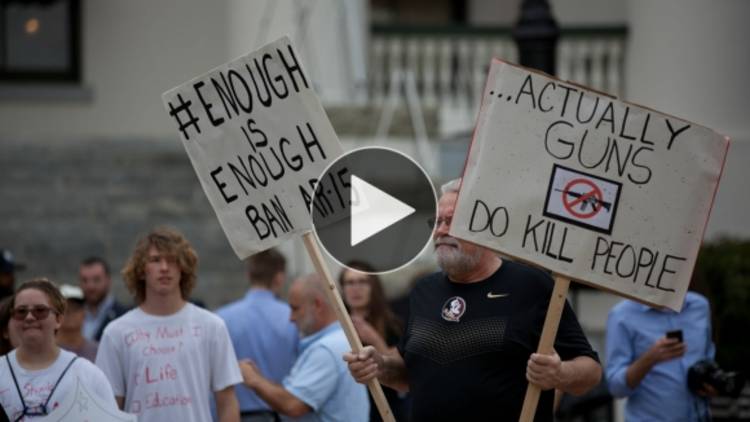 |
| What's on the table for gun control in the wake of Parkland, and what isn't |
MOMENTUM FOR MEANINGFUL ACTION ON GUNS IS FADING: -- Trump appears to be cozying back up to the National Rifle Association. After some suggestion he would support gun control measures not backed by the group in a Wednesday meeting with lawmakers, Trump had dinner with NRA leaders on Thursday night. And they seem to be back on the same page:
 |
From the gun lobby's top lobbyist:
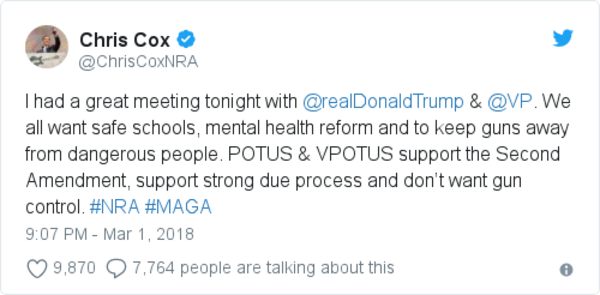 |
-- “Congress is leaving Washington in the aftermath of the latest mass shooting having done nothing to counteract systemic gun violence or improve school safety,” write Seung Min Kim, Mike DeBonis and Ed O'Keefe. “The Senate has been unable to untangle objections to a modest, relatively noncontroversial bill meant to improve the system for providing information to a federal background-check database. And without much guidance from the White House, Democrats and Republicans began laying out their proposals Thursday … but it’s far from clear how those measures can succeed without Trump’s backing.”
-- The “March for Our Lives” gun-control rally can’t be held on the National Mall later this month because of a conflict with a 'talent show.' From Justin Wm. Moyer: “Mike Litterst, a spokesman for the Park Service, said organizers proposed holding the event on the Mall but were looking to move the rally to another location after the request conflicted with a film crew’s permit. … A redacted Park Service permit application this week given to [The Post] showed the application is for a ‘student project’ related to ‘filming for a talent show.’”
-- Georgia Republican lawmakers overwhelmingly approved a bill punishing Delta for cutting ties with the NRA. Marwa Eltagouri reports: “By passing the bill, lawmakers carried out the threat that Lt. Gov. Casey Cagle (R) made to Atlanta-based Delta earlier this week: If the airline did not restore discounted fares to members of the [NRA], Republicans would strike down a $50 million sales-tax exemption on jet fuel from its larger tax-cut package. Delta, which is one of the state’s largest employers, would have been the primary beneficiary of the exemption.” This sets a very dangerous precedent.
-- Marco Rubio (R-Fla.) unveiled his plan to address gun violence, but it doesn't go nearly as far as his statements during last week’s CNN town hall. Sean Sullivan reports: “Eight days ago, [Rubio] endorsed raising the age requirement for buying a rifle from 18 to 21 and voiced openness to placing limits on the size of ammunition magazines. On Thursday, … he did not outline any specific plans on these very divisive fronts. ‘We’ll continue to explore and look at those,’ Rubio said in a speech on the Senate floor[.] … Rubio embraced a series of other, less controversial measures. They include freeing up more federal dollars to beef up school security and create ‘crisis interventions teams’; creating gun violence restraining orders; pressing school districts to promptly alert law enforcement to dangerous behavior; passing a bipartisan bill to tighten the National Instant Background Check System; and mandating the FBI notify states when a prohibited person tries to buy a gun and fails the requisite background check.”
-- The Republican governor of Massachusetts endorsed reviving a federal ban on assault weapons. The AP reports: “[Gov. Charlie] Baker's comments came after the campaign of Democratic gubernatorial candidate Setti Warren circulated a clip from a 2013 television interview in which Baker questioned the need for a federal assault weapons ban. Baker, then weighing a run for governor, said he hadn't seen evidence such a ban would be effective. The governor told reporters Wednesday that a state-level assault weapons ban has served Massachusetts well, and it would be ‘appropriate’ for Congress to adopt something similar.”
-- On the same day that a teary-eyed Sen. Tim Kaine (D-Va.) met with mothers advocating for stronger gun control, the Republican running to unseat him, Corey Stewart, held a campaign event at a shooting range — where he compared restrictions on firearms to castration. In some ways, it’s a tale of two very different Virginias, Jenna Portnoy reports. “The Southern state is home to the NRA, has some of the most lax gun laws in the country and takes pride in its deeply rooted gun culture. But in recent years, and particularly since Virginia Tech, Democrats such as Kaine have been able to win statewide races on promises of stronger gun control. Stewart has an A rating from the NRA; Kaine has an F. Although it’s impossible to predict what will drive voters eight months from now, experts say a national movement is growing[.]”
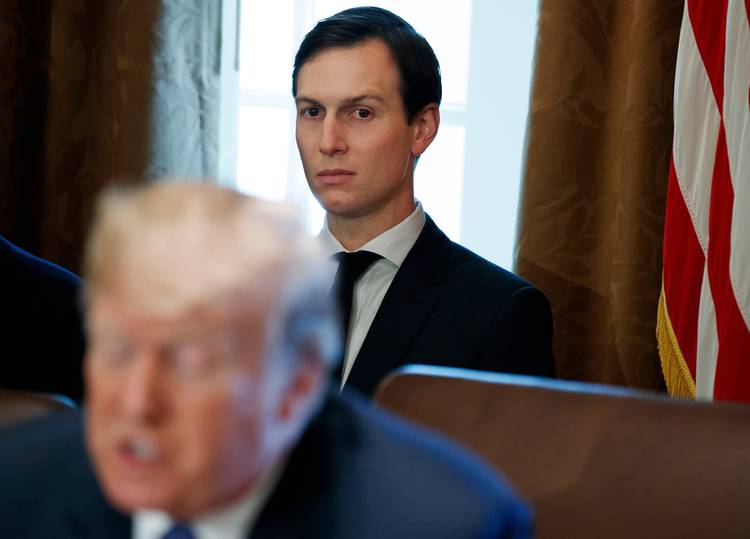
Jared Kushner listens during a Cabinet meeting at the White House. (Evan Vucci/AP)
CONFLICTS OF INTEREST:
-- Jared Kushner’s financial troubles during Trump’s presidential transition in December 2016 included an impending $1.2 billion debtfrom a family-owned building in Manhattan. Michael Kranish and Jonathan O’Connell report: “Meetings that Kushner had that month … are coming under new scrutiny after The Washington Post revealed that foreign government officials viewed him as a figure who might be manipulated due to the family company’s financial needs and his lack of experience. Kushner divested his interest in 666 Fifth Avenue when he assumed his White House role as senior adviser … But Kushner’s talks with foreign officials as the company continued searching for financial backing have raised questions.”
- “Kushner met in December 2016, while he was working with the Trump transition team, with officials of Anbang, a Chinese insurance company. The deal fell apart as Kushner moved to the White House.”
- “Kushner, or representatives of his family firm, also met with a Qatari investment company, run by the country’s former prime minister and finance minister, Hamad Bin Jasim al-Thani … Tom Barrack, a Trump friend … said Charles Kushner was ‘crushed’ when his son got the White House job because that prompted the Qataris to pull out.”
- “[Kushner] also met on Dec. 13, 2016, with Russian banker Sergey Gorkov, who heads a state-affiliated bank known as VEB, for Vnesheconombank. The bank has said they talked about ‘promising business lines and sectors,’ but Kushner told Congress that the family business was not discussed.”
-- Kushner’s recent downfall has displeased, although not entirely surprised, his father-in-law, report Philip Rucker, Ashley Parker and Josh Dawsey. “Once the prince of Trump’s Washington, Kushner is now stripped of his access to the nation’s deepest secrets, isolated and badly weakened inside the administration, under scrutiny for his mixing of business and government work and facing the possibility of grave legal peril in the Russia probe. … [Trump] was angry that Kushner — and, by extension, daughter Ivanka — were in his view being dishonestly maligned. But he also mused this week that everything might be better for them if they simply gave up their government jobs and returned to New York, according to a White House official who has discussed it with him.”
Phil, Ashley and Josh spoke to over a dozen Trump insiders on Kushner’s fall from grace: “[One official] said the uncertainty surrounding [Robert Mueller’s] Russia probe has cast a cloud over Kushner in particular. ‘Some of his administration colleagues are just more reluctant to have conversations with him or in his company because they’re not sure if he’s a witness or a target of the Mueller investigation,’ the official said. … Trump and his family were frustrated by how Kelly handled the rollout of clearance changes and felt Kushner was unfairly exposed, according to people who have spoken with them. The president’s adult sons, Donald Trump Jr. and Eric, were especially angry and felt that by not protecting Kushner, Kelly had been disloyal to the president himself[.]”
-- For perspective: The White House calligrapher has a higher security clearance than Kushner. (CNN’s Betsy Klein)
-- FBI counterintelligence officials are looking into one of Ivanka Trump’s business deals. From CNN’s Sara Murray, Shimon Prokupecz and Kara Scannell: “The FBI has been looking into the negotiations and financing surrounding Trump International Hotel and Tower in Vancouver, according to a US official and a former US official. The scrutiny could be a hurdle for the first daughter as she tries to obtain a full security clearance in her role as [a White House adviser]. … The development — a 616-foot beacon dotting the Vancouver skyline and featuring a trademarked Ivanka Trump spa — opened in February 2017, just after Trump took office. … [I]t's not clear why investigators are examining this particular deal.”
-- The Maryland Senate gave preliminary approval to a bill requiring presidential candidates to publicly release their income tax returns before their names are listed on the state's ballot. (Ovetta Wiggins)
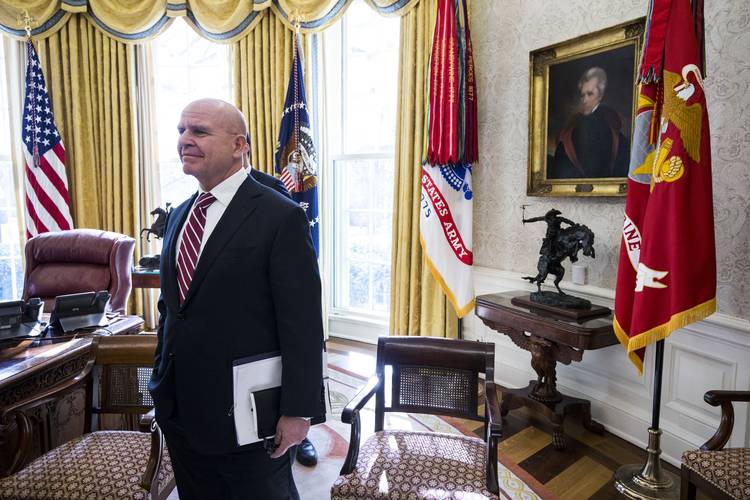
H.R. McMaster watches President Trump meet with North Korean defectors. (Zach Gibson/EPA-EFE)
ALL THE PRESIDENT'S MEN AND WOMEN:
-- Drama in the NSC: H.R. McMaster could leave his role as national security adviser as soon as next month, NBC's Nicolle Wallace reported last night: “A leading candidate to become [Trump’s] third national security adviser is the auto industry executive Stephen Biegun … [who also] served on the National Security Council staff from 2001 to 2003[.]”
-- Logistics have held up McMaster's long-predicted departure, sources tell Greg Jaffe and Josh Dawsey: “Trump has often seemed eager to move on from the Army three-star general, who has struggled to bond with his irascible boss. And McMaster, who friends said has threatened to quit in fits of frustration and anger, has seemed eager to leave. But efforts to move McMaster back to the Army have been stymied by two issues: Trump has had trouble finding a high-quality replacement who is willing and able to take over, and it is also not clear that McMaster, still an active-duty general officer, has any place to go in the Army. The net result is one of the weaker National Security Councils in recent memory …
“McMaster has had an especially strained relationship with Defense Secretary Jim Mattis, a favorite of the president’s, who has been slow to respond to McMaster’s requests for military options to counter adversaries such as Iran and North Korea … ‘He treats me like a three-star’ rather than a coequal, McMaster has complained to colleagues of Mattis, a retired four-star Marine Corps general.
“It is widely known that Trump has often grown frustrated with McMaster during meetings, complaining that he drones on too long and can be too rigid in his thinking. This summer, at a low point in their relationship, McMaster entered the Oval Office only to have Trump complain that he had already seen him that day. McMaster reminded the president that he often needed to brief him on fast-moving events. … Other officials said McMaster has stormed out of the West Wing or threatened to quit in front of his staff, only to calm down a few hours later.”
-- The U.S. ambassador to Mexico, Roberta S. Jacobson, announced she will be stepping down, joining a growing exodus of senior diplomatic staffers who have resigned amid tension with Trump. The New York Times’s Azam Ahmed reports: “Analysts say her departure will be deeply felt by both American and Mexican officials — she was one of the most experienced Latin America experts in the State Department, having spent most of her 31 years there focusing on the region. ‘I have come to the difficult decision that it is the right time to move on to new challenges and adventures,’ Mrs. Jacobson wrote in her letter. ‘This decision is all the more difficult because of my profound belief in the importance of the U.S.-Mexico relationship and knowledge that it is at a crucial moment.’ The Trump administration has selected a nominee to fill Mrs. Jacobson’s vacancy, but has not yet released the name.”
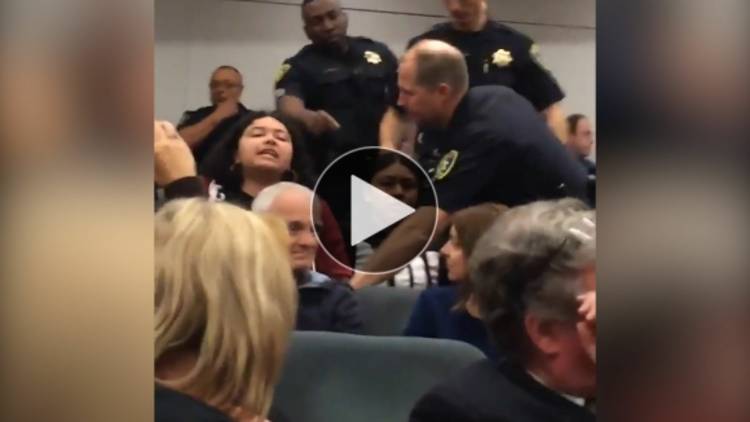 |
| Protester heckles Mnuchin, removed from speaking event |
-- Catherine Rampell acquired footage of the UCLA event where Treasury Secretary Steven Mnuchin was heckled. After the poor reception, Mnuchin rescinded his permission for UCLA to post its video of the public event.
-- HUD Secretary Ben Carson is seeking to cancel the order for a $31,000 office dining set. CNN’s Rene Marsh reports: “‘I was as surprised as anyone to find out that a $31,000 dining set had been ordered,’ Carson said in [a] statement. ‘I have requested that the order be canceled. We will find another solution for the furniture replacement.’ Carson also said his wife, Candy Carson, had ‘asked if used furniture was an option,’ the first time there's been an indication that she was involved in the process. ‘My wife also looked at catalogs and wanted to be sure that the color of the chair fabric of any set that was chosen matched the rest of the decor,’ he wrote.”
-- EPA Administrator Scott Pruitt said he plans to spend “more time” in coach. After mounting backlash for his highflying lifestyle on the taxpayer's dime, Pruitt stopped short of saying he plans to fly coach on all future trips and reiterated that his personal security detail recommended last year that he begin flying first class because of the number of threats he has faced. (Brady Dennis and Juliet Eilperin)
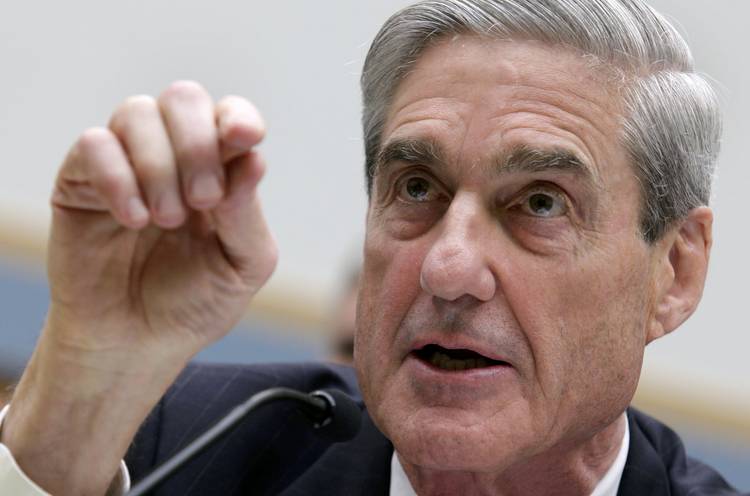
Special counsel Robert Mueller is building a criminal case against Russians tied to the release of DNC emails. (Yuri Gripas/Reuters)
THERE’S A BEAR IN THE WOODS:
-- Robert Mueller is building a criminal case against the group of Russians responsible for stealing and disseminating a trove of emails from the DNC and former Clinton campaign chairman John Podesta during the 2016 election. NBC News’s Ken Dilanian, William M. Arkin and Julia Ainsley report: “Much like the indictment Mueller filed last month charging a different group of Russians … the possible new charges are expected to rely heavily on secret intelligence gathered by the CIA, the FBI, the [NSA] and [DHS]. Sources say he has long had sufficient evidence to make a case, but strategic issues could dictate the timing. ... It's also possible Mueller opts not to move forward because of [intelligence concerns], or that he files the indictment under seal … It could not be learned to what extent, if at all, Mueller's office would make allegations in the possible indictments about [Vladimir Putin’s role] in ordering and supervising the operation.”
-- Senate Intelligence leaders have concluded their Republican counterparts on the House Intelligence Committee were responsible for leaking private texts of Sen. Mark Warner (D-Va.) to a Russia-connected lawyer — illustrating just how far the two panels have diverged. The New York Times’s Nicholas Fandos reports: “Senator Richard M. Burr of North Carolina, the committee’s Republican chairman, and [Warner] were so perturbed by the leak that they demanded a rare meeting with [Paul Ryan] last month to inform him of their findings. They used the meeting with Mr. Ryan to raise broader concerns about the direction of the House Intelligence Committee under [Rep. Devin Nunes]. To the senators … the leak was a serious breach of protocol and a partisan attack by one intelligence committee against the other.”
-- A Kremlin-linked Russian politician is claiming that his connections to NRA leaders allowed him to open influential doors in American politics. From NPR’s Tim Mak: “Russian politician Alexander Torshin claimed his ties to the [NRA] provided him access to [Trump] — and the opportunity to serve as a foreign election observer in the United States during the 2012 election. Torshin is a prolific Twitter user, logging nearly 150,000 tweets, mostly in Russian, since his account was created in 2011. Previously obscured by language and by sheer volume of tweets, Torshin has written numerous times about his connections with the NRA, of which he's a known paid lifetime member.” The FBI is reportedly investigating Torshin for attempting to aid Trump by illegally funneling money to the NRA.
-- Rick Gates canceled a visit to Boston after an online commenter responded to a story about the scheduled trip by invoking the Russian mafia. The former Trump campaign adviser didn’t consider the trip prudent after the Boston Globe article "generated comments on the internet, some of which were of a threatening character," Gates’s attorney wrote in a court filing. (CNN)
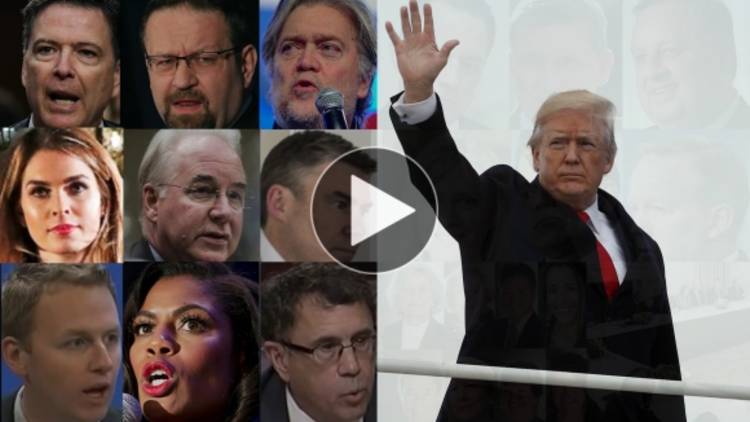 |
| Casualties of the Trump administration |
HOPE IS GONE:
-- Hope Hicks refused this week to tell lawmakers whether she had lied on behalf of a number of top White House and campaign officials, even as she admitted to telling “white lies” on Trump’s behalf. Karoun Demirjian and Ellen Nakashima report: “A Democrat and a Republican on the panel said Thursday that Hicks refused to answer questions Tuesday about whether she had been asked to lie by White House aides and Trump’s family members, including Jared Kushner, Ivanka Trump and Donald Trump Jr., [SteveBannon], and former campaign officials Corey Lewandowski and PaulManafort. The one exception she made, according to Rep. Eric Swalwell (D-Calif.), was acknowledging that [Michael Flynn] had asked her during the transition period to dissemble about questions he was getting regarding his conversations with the Russian ambassador, Sergey Kislyak. She claimed that she did not know she was being asked to lie but that she felt Flynn was being ‘dishonest,’ Swalwellsaid. …
“Hicks’s … recalcitrance left Democrats and Republicans on the panel with radically different interpretations about the meaning of her answers — particularly her admission that she had told ‘white lies.’ If your response to the question ‘Have you ever lied for your boss?’ is to pause and take two timeouts, then we already know the answer,’ Swalwell said … ‘She couldn’t answer it.’”
-- Vanity Fair’s Gabriel Sherman writes that Hicks’s departure reaches “into Trump’s own bunker in a way no other event has to this point.” “But in recent weeks, Hicks became disillusioned with her job, people who’ve spoken with her told me. Her closeness to Trump meant she was also nearest to the hottest flames of the fires that have burned in the West Wing, the most intense being the Russia probe. Hicks has racked up substantial legal fees, one source told me. ‘She’s in immense personal jeopardy,’ one Republican close to the White House said yesterday. ‘This is a sign the Mueller investigation is a lot more serious than any one of us thought.’”
-- Despite warnings from his legal team, Trump talked about the Russia investigations with Hicks, report Politico’s Darren Samuelsohn and Eliana Johnson. “‘I think the president has put her in a very precarious position,’ a senior Trump administration official said in a recent interview. Hicks is not alone. Current and former Trump aides describe a president who often fails to observe boundaries about the Russia probe and who calls staffers into his office and raises the subject without warning. Hicks in particular, Trump told her, could be ‘on both sides of the [bright] line.’”
-- “[Hicks] … is kidding herself if she thinks that her tenure will be judged only for harmless, situational untruths,” the New Yorker’s David Remnick writes. “The Administration’s penchant for deception is injurious in many ways, not least because it devalues truth as a value in public discourse. Like [Spicer, Conway and Sanders], Hicks, even in her camera- and microphone-shy way, spent years being loyal to Trump and his mendacities. She was always prepared to do his bidding, including when there was an ugliness to the bidding: She pushed back hard against the Pope when he dared to criticize the President’s hopes to wall off Mexico. She cast her lot with him and stayed with him as the injuries he inflicted multiplied. Perhaps [Hicks] will retain her sense of discretion long after she leaves the White House. In any case … the self-deception required to serve [Trump] with such unquestioning devotion, to be his voice, knowing what she must know, has proved anything but harmless.”
-- Many mid- and low-level aides in the Trump White House are “actively” seeking jobs elsewhere, BuzzFeed's Tarini Parti and Matt Berman report. “Those staffers saw the surprising resignation of [Hope Hicks] as a sort of tipping point. … A former White House official said he's spoken with more aides inside the White House who are trying to leave the administration, but not necessarily getting the kinds of high-paying offers in the corporate world as former aides usually do. ‘Things are still pretty bleak inside the White House,’ the source said. ‘I've talked to several people in the last week trying to find a way out, but they can't get out because no one is really hiring people with Trump White House experience. Not a fun time to say the least.’”
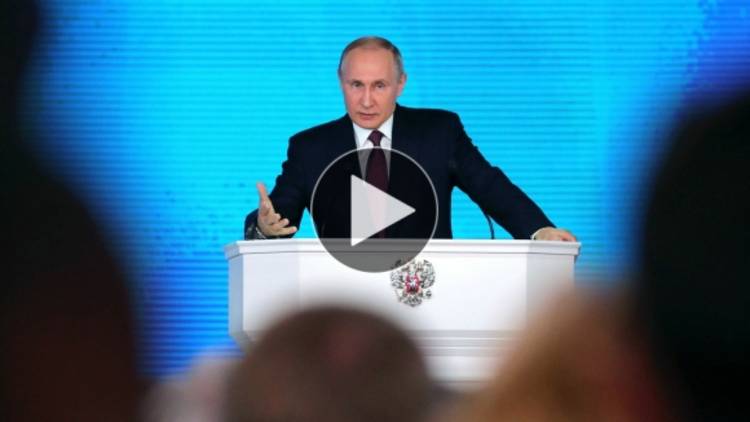 |
| Putin: Russia tested nuclear-powered cruise missile impervious to U.S. defense shields |
U.S.-RUSSIAN RELATIONS GET CHILLIER:
-- The Trump administration said that it intends to sell antitank missiles to Ukraine, which troops could use to combat Russian-backed separatists. Dan Lamothe reports: “The State Department announced its intention to send the weapons in a notification to Congress, saying that they will cost about $47 million. The deal would include 210 missiles and 37 launch units and training on how to use them. … Numerous Republicans [have urged] Trump to do more to assist Ukrainian troops … with a frequent emphasis on antitank weapons. … Ukrainian officials have asked the United States to send lethal aid to them for years to counter the separatists.”
-- Experts doubt Vladimir Putin’s claim that Russia has developed “invincible” nuclear weapons will shift the balance of power between the Kremlin and Washington. Karen DeYoung reports: “[The two nations] already have the ability to destroy each other many times over. At the same time, there is widespread agreement that the rhetorical attacks, stalled diplomacy and military escalation that increasingly characterize U.S.-Russia relations are counterproductive to global security.
“The tension level is high, higher now than it was several months ago, in part because the Russians have gotten past the phase where they thought with [Trump] they would be able to move the relationship in a different direction,” said Thomas Graham, senior director for Russia on the George W. Bush National Security Council staff. “This is qualitatively worse than any post-Cold War period.”
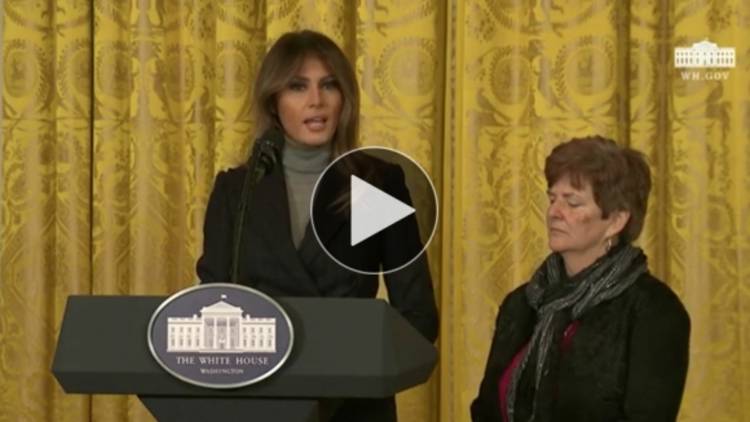 |
| Melania Trump consoles mother who lost son to opioid overdose |
THE REST OF TRUMP’S AGENDA:
-- During a White House summit on the opioid epidemic, Trump suggested executing drug dealers as a means of combating the crisis. Katie Zezima reports: “'Some countries have a very tough penalty, the ultimate penalty, and they have much less of a drug problem than we do,’ Trump said. Trump also said that the administration will roll out unspecified ‘strong’ policies on opioids over the next three weeks. He said he has spoken to [Jeff Sessions] about ‘bringing a lawsuit against some of these opioid companies.’ White House officials said that the administration is considering whether to make trafficking large quantities of fentanyl a capital crime because of the drug’s potential to kill so many. ‘If you shoot one person, you get life in prison,’ Trump said. ‘These people kill 1,000, 2,000 people, and nothing happens to them.’
-- The Trump administration is considering striking North Korea if Pyongyang develops a nuclear weapon capable of hitting the United States. CNN’s Jim Sciutto and Dana Bash report: “Beyond the missile threat to the US homeland, the national security officials pushing for military action believe that if North Korea becomes a full nuclear power, it will proliferate, potentially sharing nuclear and missile technology with states such as Iran, Pakistan and Libya, and non-state actors. Such a prospect would increase the nuclear threat to US interests.”
-- Lawmakers have added provisions to a pair of must pass spending bills that could affect campaign finance law. Michelle Ye Hee Lee reports: “One measure would roll back limits on churches, which are prohibited under current law from advocating for candidates because of their tax-exempt status. Other changes would relax rules affecting secret and wealthy donors and increase the amount of cash that political parties could spend on candidates.”
-- The Justice Department is reviewing the actions of the Oakland mayor who warned local immigrants about an impending ICE operation. From Meagan Flynn: “Critics have said that [Mayor Libby] Schaaf’s decision to warn immigrants of the raid amounted to obstruction of justice, something she has adamantly denied.”
-- DHS offered to dismiss the deportation proceedings of Elia Crawford, who is married to an Army Special Forces veteran. The family’s attorney said, “Once the judge approves the dismissal, this would allow Mrs. Crawford to pursue permanent legal status. While we are encouraged by this latest development there will still be a long road ahead.” (Military Times)
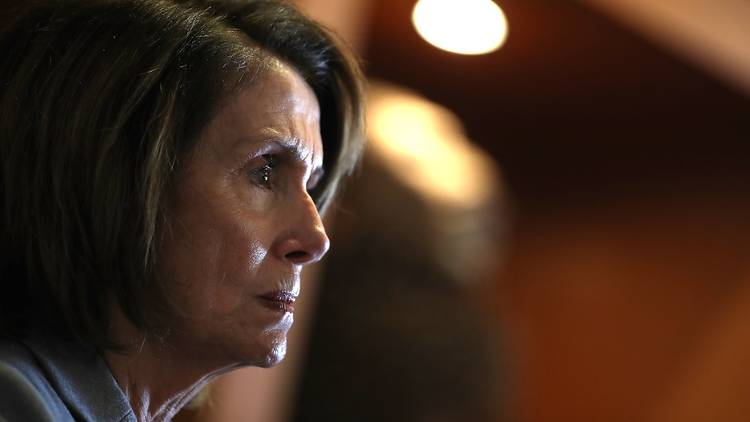
House Minority Leader Nancy Pelosi speaks at a news conference in San Francisco. (Justin Sullivan/Getty Images)
THE ROAD TO NOVEMBER (AND 2020):
-- Trump’s close ties to the group America First Priorities raised concerns about possible coordination between the nonprofit, the RNC and the White House. CNBC’s Christina Wilkie reports: “Much of what the group polls and surveys would be standard work for a presidential campaign or a major political party. But America First Policies … is not a campaign or a party. It's what the IRS calls a ‘social welfare organization,’ permitted to operate tax-free and keep its donors secret as long as its main focus isn't politics and it doesn't coordinate with candidates. … America First Policies, which actively advocates for policies favored by Trump, denied that any of the [documents] were intended to benefit the White House or the president … Yet the lines between the group, the White House and Trump's campaign are often blurred.”
- Brad Parscale, who led the Trump’s 2016 digital operation and was tapped this week to manage his 2020 reelection campaign, is a founder of America First Policies.
- Former Trump campaign manager Corey Lewandowski is also a senior adviser, and reportedly met with Trump and John Kelly in the Oval Office last week.
- Former campaign spokeswoman Katrina Pierson is also a key adviser to the group. She has been spotted with Trump as recently as his first State of the Union address.
-- Republicans are struggling to find an effective line of attack against Conor Lamb, the Democrat in Pennsylvania’s special election. Dave Weigel writes: “The race in the 18th District, which was drawn to safely reelect a Republican congressman, only to see him resign last year, has closed to single digits despite an onslaught of Republican spending. On the air and in mailboxes, it has previewed many of the attacks Republicans may use this year to protect their control of the House … [T]he Pennsylvania race has found Republicans nervously changing both positive messaging and attack lines, with little of it appearing to stick. Lamb is hard to pin down on the issues they are throwing at him.”
-- Joe Biden will visit the district next week to campaign for Lamb. (Pittsburgh Post-Gazette)
-- The liberal Center for American Progress’s “Ideas Conference,” described by some as a “CPAC for the left,” will feature several potential 2020 contenders. Sens. Bernie Sanders (Vt.), Kirsten Gillibrand (N.Y.), Elizabeth Warren (Mass.), Cory Booker (N.J.), and Sherrod Brown (Ohio) are expected to attend, and Bill De Blasio. (Dave Weigel)
-- Generational political differences are distinct and growing, according to a new Pew poll. Just 27 percent of millennials approve of Trump’s job performance, compared to 44 percent of baby boomers. The research center reports: “Millennials remain the most liberal and Democratic of the adult generations. They continue to be the most likely to identify with the Democratic Party or lean Democratic. In addition, far more Millennials than those in older generational cohorts favor the Democratic candidate in November’s midterm congressional elections. … In some cases, generational differences in political attitudes are not new. … [But] divisions among generations have grown. In the case of views of racial discrimination, the differences have widened considerably just in the past few years.”
SOCIAL MEDIA SPEED READ:
Trump was up early this morning to attack his SNL counterpart, whom he called “Alex” Baldwin in his original tweet, where he also misspelled dying.
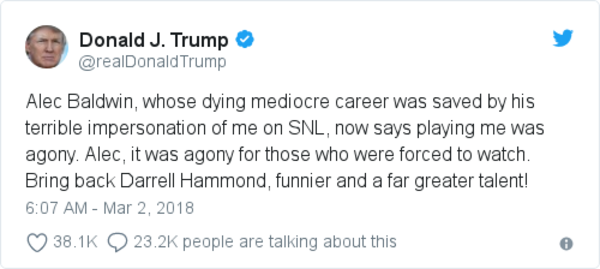 |
A former spokesman for Obama's Justice Department promised this:
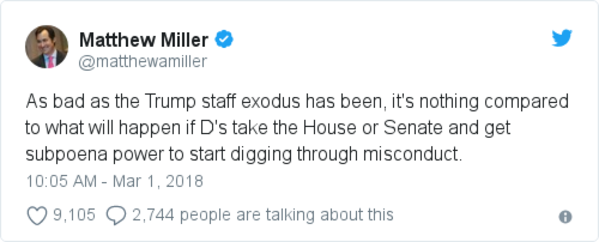 |
From a Bloomberg News columnist:
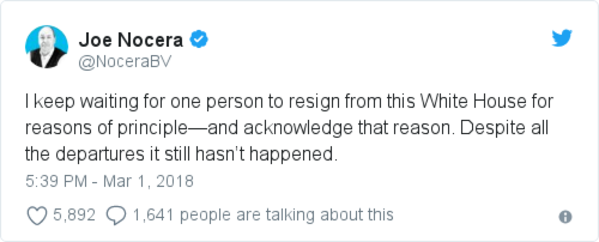 |
A Fox News contributor explained the acronym AR-15:
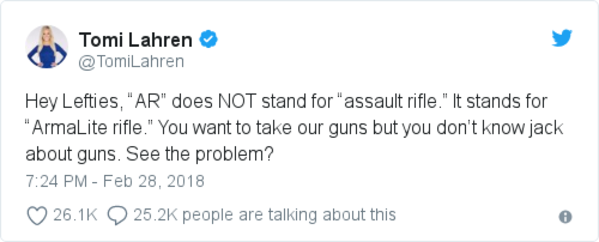 |
A House Democrat and Iraq War veteran replied:
 |
Rep. John Lewis (D-Ga.) expressed support for the biggest employer in his hometown, which is being brutalized by Republicans in the state legislature for cutting its ties to the NRA:
 |
A conservative pollster responded to the new Pew poll:
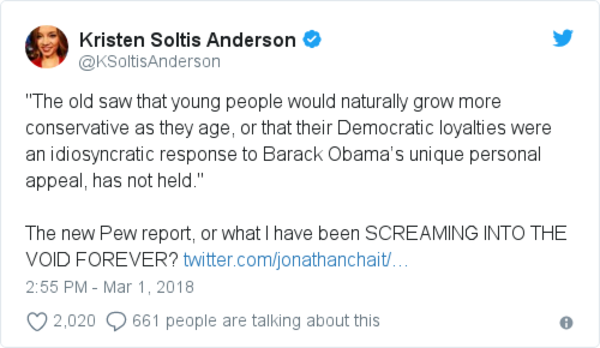 |
The Office of Government Ethics's former director called out House Republicans for leaking a senator's texts:
 |
From a GOP strategist:
 |
George W. Bush's former communications director replied to Wilson:
 |
As Trump mused about videos games being a bad influence on kids, a Post reporter provided this throwback:
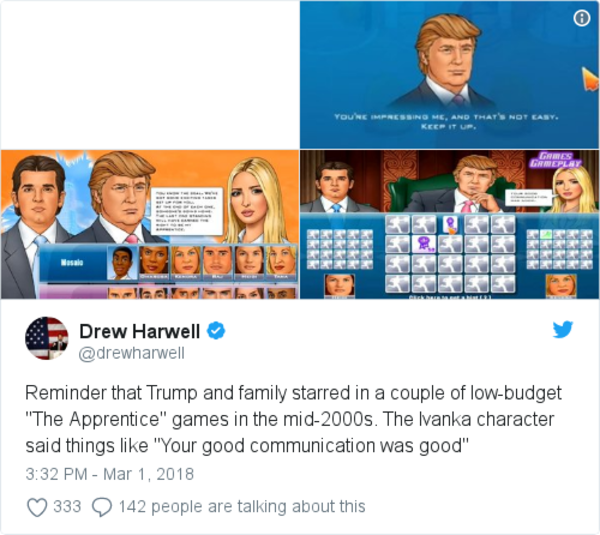 |
And The Post's White House editor summarized the epic month of February in Trump's Washington:
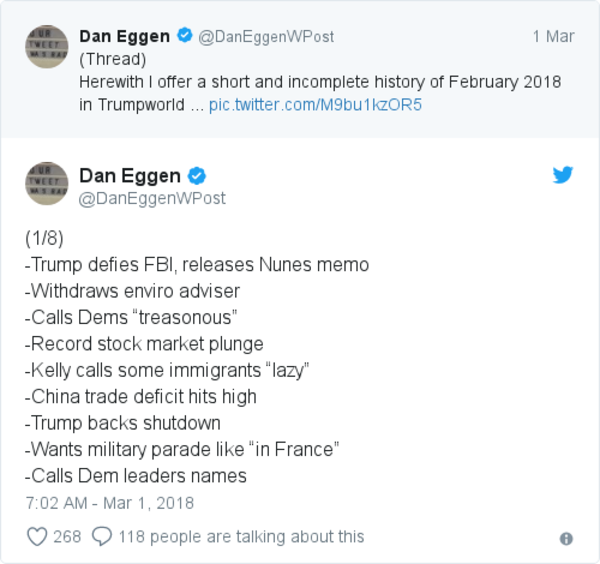 |
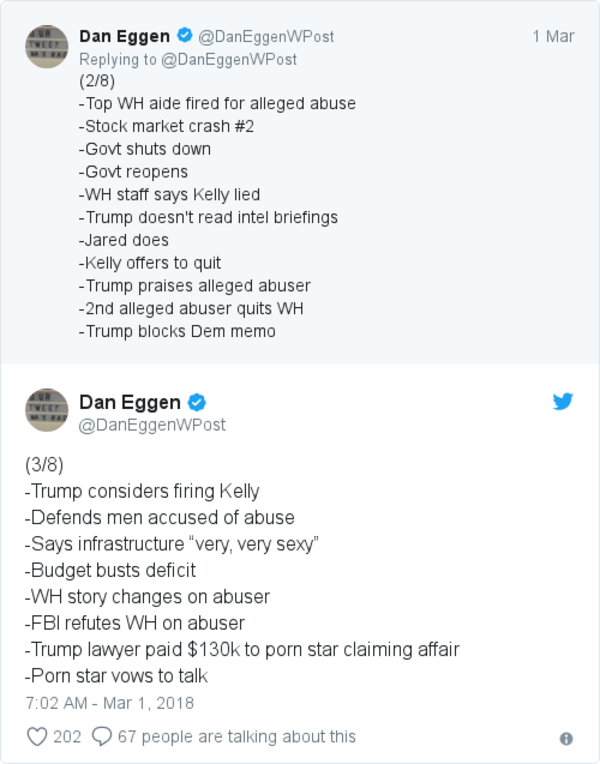 |
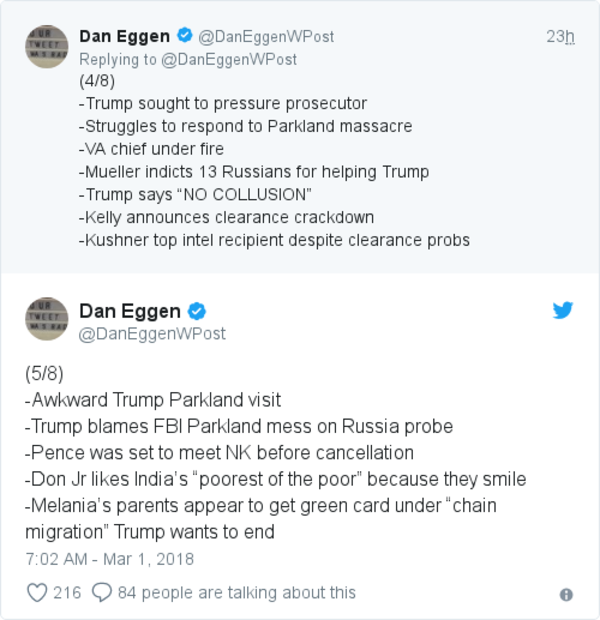 |
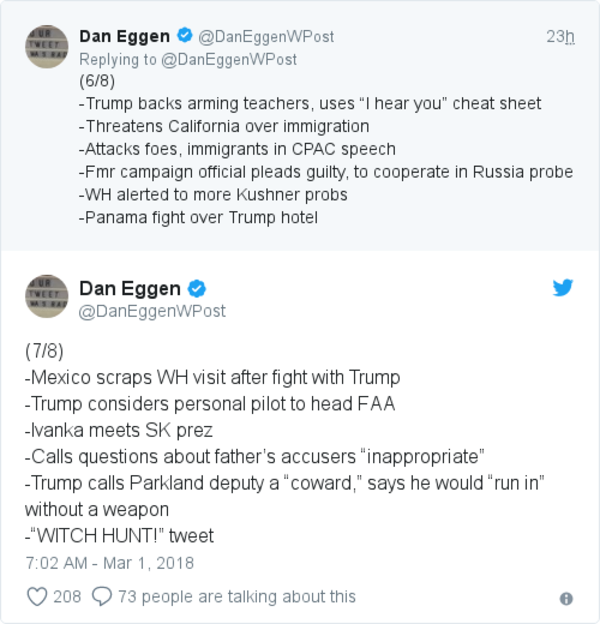 |
And finally:
 |
Welcome to March. The Daily 202 will keep you up to speed.
GOOD READS FROM ELSEWHERE:
-- Time, “Hollywood Is Suddenly Serious. That's Exactly What America Needs Right Now,” by Stephanie Zacharek: “Although Hollywood has long been awash in liberal thinking, it’s also a place steeped in tradition and habit. And let’s hang on to some healthy cynicism: it is absolutely a place where making money takes precedence over just about everything else. … [But] Hollywood is examining everything in a new, more starkly revealing light. Over the past five months alone, Hollywood has moved quickly to right long-established wrongs and to rattle ancient modes of thinking.”
-- The Atlantic, “A Horrifying Path to America for Hotel Workers,” by Ariel Ramchandani: “Racida Eslabon came to the U.S. expecting to send money back home to the Philippines. She still hasn’t told her mother what happened after she arrived.”
-- Bloomberg Businessweek, “Harvard Blew $1 Billion in Bet on Tomatoes, Sugar, and Eucalyptus,” by Michael McDonald and Tatiana Freitas: “Harvard made many mistakes over the last decade, according to Thomas Gilbert, a finance professor at the University of Washington, but almost all of them boiled down to a single miscalculation: the belief that its top money managers — who were paid $242 million from 2010 through 2014 — were smarter than everyone else and could handle the risks almost all other endowments avoided. ‘They became loose cannons,’ Gilbert says. ‘When you’re managing donor money, it’s appalling.’”
HOT ON THE LEFT
“Jimmy Kimmel was happy to make us laugh. Until he cried,” from Geoff Edgers: “It is quite a time to be Jimmy Kimmel. Sunday night, he’ll return to host the Oscars with a growing profile. For years, Kimmel was a kind of also-ran in the late-night battle between NBC’s “The Tonight Show” and CBS’s “The Late Show[.]’ … Then last April, Kimmel and [his wife Molly] McNearney’s newborn son was born with a heart defect and had to undergo emergency surgery. When Kimmel returned to the air to tell his audience about Billy, millions of viewers were moved by something rarely, if ever, seen on late night television: Vulnerability. … He connected Billy’s battle with a larger issue at hand, namely President Trump’s attempts to cut the National Institutes of Health. Suddenly, Kimmel was being discussed on the op-ed pages.”
|
HOT ON THE RIGHT
“Manufacturing in U.S. Expands at Fastest Pace Since May 2004,” fromBloomberg News: “U.S. factories expanded in February at the fastest rate since May 2004, indicating sustained strength in manufacturing as demand remains solid, figures from the Institute for Supply Management showed Thursday. The latest advance extends a series of healthy readings in the survey-based measure of manufacturing that’s being fueled by improving global economies and firm business investment. It also comes on the heels of a late-year pickup in consumer spending, which advanced in the fourth quarter at the fastest pace in more than a year. The purchasing managers group’s gauge of export orders was the strongest since April 2011. While orders and production were a touch weaker in February than the prior month, the readings are nonetheless robust."
|
DAYBOOK:
Trump will attend Billy Graham’s funeral in Charlotte before traveling to Mar-a-Lago, where he will host an RNC roundtable and give a speech at a committee fundraiser.
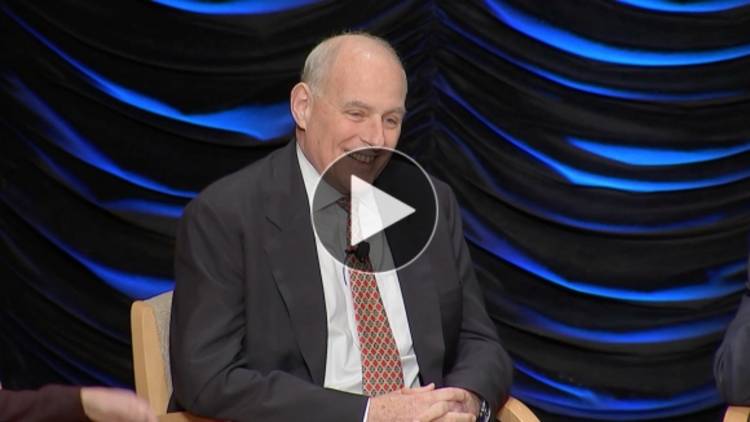 |
| John Kelly on leaving DHS: 'I did something wrong and God punished me, I guess' |
v
NEWS YOU CAN USE IF YOU LIVE IN D.C.:
-- A Democrat hoping to oust Rep. Barbara Comstock (R-Va.) has criticized her ties to a conservative women’s group. From Jenna Portnoy: “The Independent Women’s Forum’s skepticism of the #MeToo movement and sexual harassment training undercuts Comstock’s support for victims of sexual harassment, according to [state Sen. Jennifer] Wexton (D-Loudoun). … The Forum’s website features articles that argue flawed sexual harassment training is harmful because it reinforces gender stereotypes and the #MeToo movement may unfairly depict all men as potential predators. Wexton said Comstock should ‘denounce their repulsive statements.’”
-- Only 42 percent of seniors attending D.C. public schools are on track to graduate. The figures represents a 31-point drop from last year, the latest fallout of the District’s diploma scandal. (Perry Stein)
-- A Tennessee woman who crashed her van into a White House barricade was found unfit to stand trial. Jessica Ford, who was arrested last Friday, claimed her fiancé was the president. (Keith L. Alexander and Spencer S. Hsu)
VIDEOS OF THE DAY:
Late-night hosts cracked jokes about the departure of Hope Hicks:
Comedy Central's Jordan Klepper visited CPAC to talk about guns:
Former Fox News anchor Eric Bolling shared the story of his son's opioid overdose:
A street artist in Los Angeles unveiled a "Casting Couch" statue that features a life-sized Harvey Weinstein in a bathrobe:
The Utah House of Representatives made a rap video. Whatever you're imagining, it's worse:
|
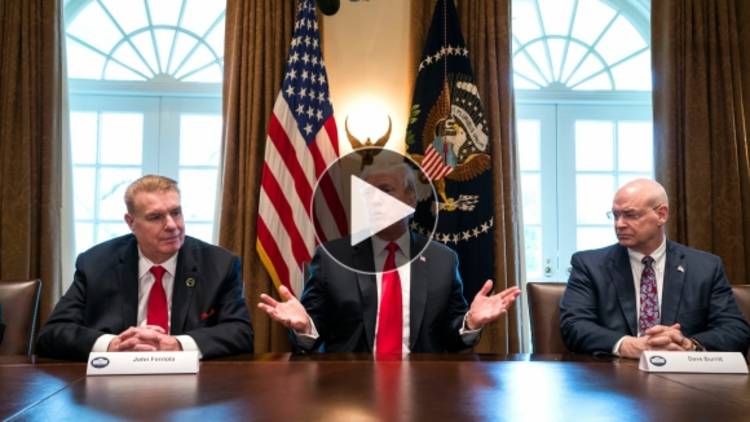
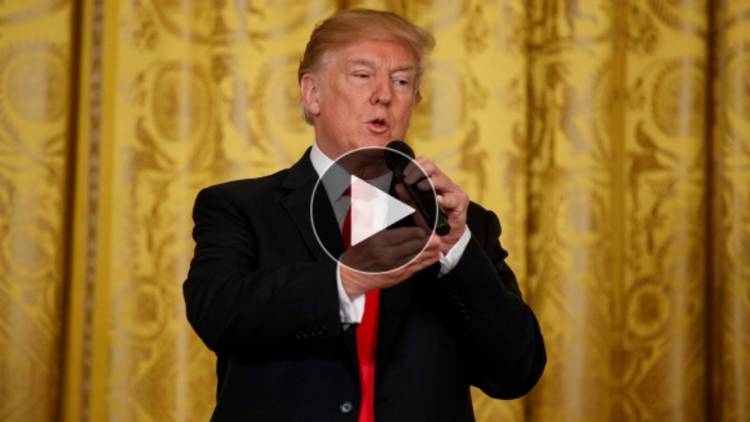
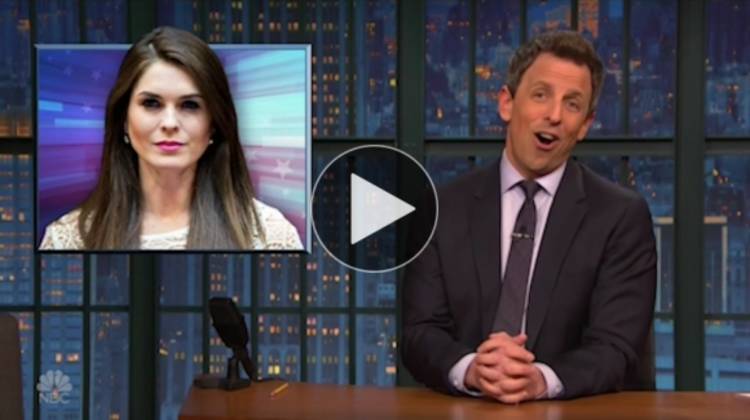
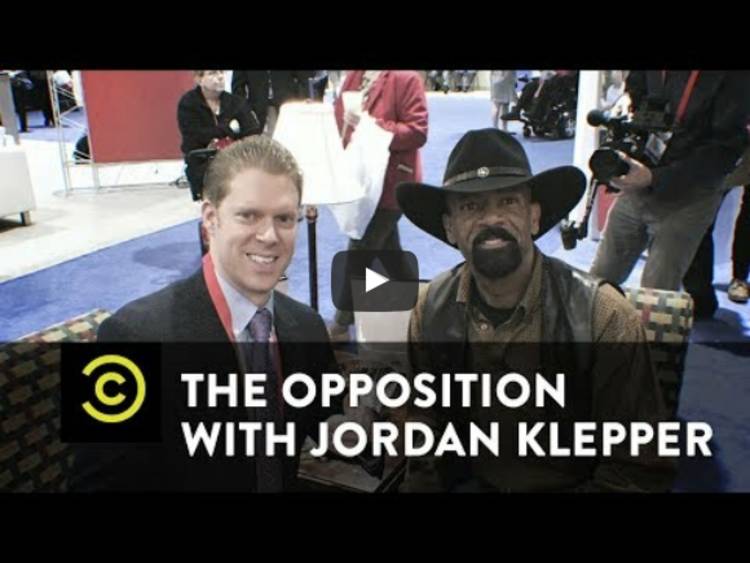
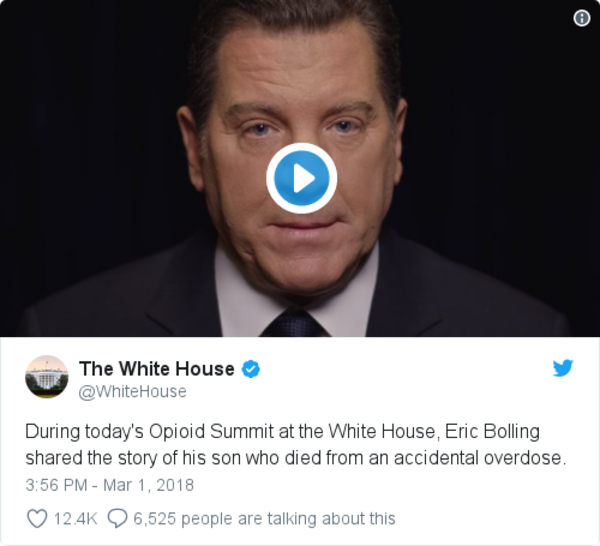
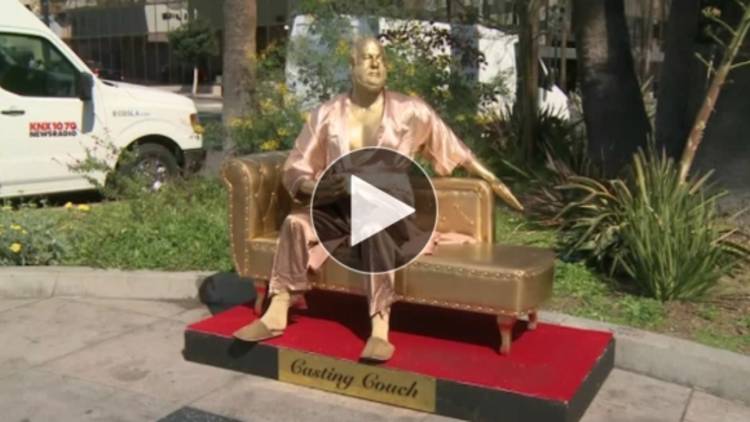
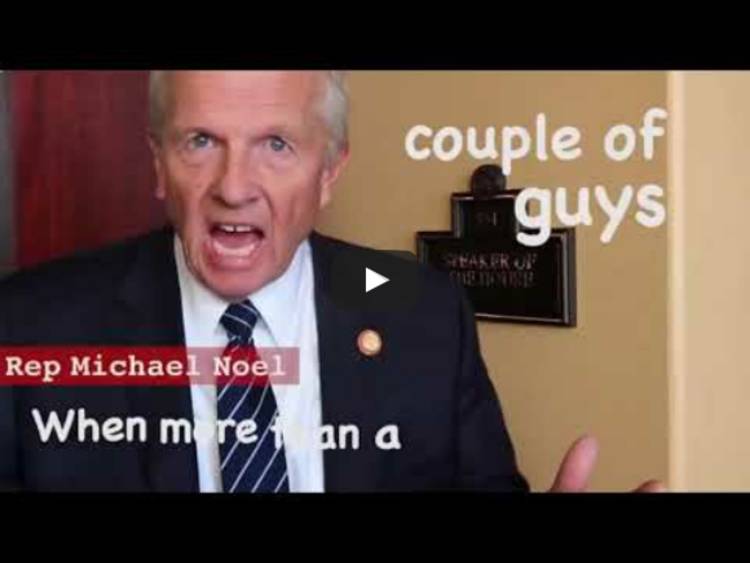
Comments
Post a Comment